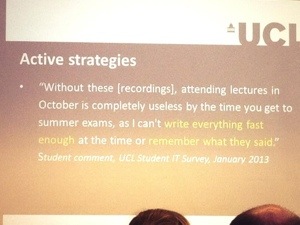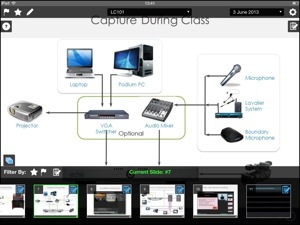Date: July 3rd, 2013
Location: Loughborough University
Details: “Pedagogy, policy and support: taking lecture capture to the next level”
Twitter hashtag: #lborolc13
With discussions taking place around the College and University about the merits and technicalities of providing students with recorded materials, the timing couldn’t have been better for this workshop.
Hosted by Loughborough University with keynotes and sessions from leading users and supporters of lecture capture technology, the event was a good introduction to what experienced users are doing with he established technology, and how these enhancements are being vowed and used by students.
What do I want to get from today? I’ve used and been a supporter of lecture capture for many years now, and am enthusiastic for its introduction at Leicester. I want to build on my existing knowledge and understanding, how this has changed in the year or so since I moved to Leicester, and how established users of lecture capture technology are taking things forward and developing the techniques and pedagogy surrounding the technology.
We also need to be careful we do not ignore the ‘other’ questions that need asking: it’s not only about the students and pedagogic use of the technology, it’s also about how it’s implemented. We need to be sure to address the resources and resourcing, the implementation, the strategy surrounding its installation and use, the pedagogy, the support, etc. It is not about how we use it, it’s about how well we use it.
Keynote 1: Steve Rowett – “Lectures, lecture capture and thinking”
Steve introduced the standard questions that we always find ourselves answering: attendance, effectiveness, passive or active learning, etc. From Steve’s experience at University College London (UCL) we can see how well a carefully implemented and structured use of the lecture capture technology can help/make students work harder (not longer, but harder).
- Figures from UCL support revision use for recorded materials : 10,000 views per week rises to 15,000 views per week in the run up to exams and assignment deadlines.
- Lecture capture is the wrong name, it is video and is “highly disruptive”? This is not always popular or correct and it depends on how faculty or students use it – figures show that students view sections or snippets of recordings that are relevant to them and what they want to gain or learn from the recording. Many do not view the whole recording – is this the same for DL?

- Future development at UCL include live streaming and ‘active lectures’. Live streaming (including interactive elements) is popular with students but not necessarily so for faculty. While the students claim they would still come to classes, there are no figures to back this up yet. Faculty say why should they bother to turn up if the students don’t, which is also a question about the provision of recorded lectures. Active learning … ROCKET “Reinventing Our Creation of Knowledge in Engineering Teaching” to accommodate growing cohort sizes in an environment where there is no chance to build bigger infrastructure to support them, using a flipped-classroom approach to the lecture and seminar timetable.
Keynote 2: Lazar Zindovic – “Lecture capture: the student perspective”
Lazar is the VP for Education from Loughborough’s SU, and represents a very vocal element of students who want the use of recorded lectures made across the whole of the University. Will this affect the engagement and expectations of students, even increase it?
- Students have embraced lecture capture and say it gives the second chance for notes, idea, theories, revision, etc. and use it to learn at their own pace.
- Recorded materials enable athletic students to attend events, training, etc. without losing the learning or knowledge, and enabled inclusion with peers in assignments and group work.
- Dyslexic students find this essential to their learning without making them feel second class citizens requiring special treatment or note-takers.
- Peer pressure: students who don’t have available recorded materials are jealous of those who do, and start the discussion with their student reps or academic departments to pressure them to start using it!
- Student expect more for the tuition fees they are paying – will provision or use of recorded lectures make it to the KIS (Key Information Set) scores … and if so will it effect choice of where to go to University? Further to this question is whether the flipped classroom approach enables the time allocated to watching pre-recorded material counts as part of the ‘contact time’ used in the KIS score?
- Students have the expectation of ‘everything -E’: eBooks, social media, online learning, blended learning, etc. and recorded lectures (or flipped classroom approach) is expected and obvious if missing.
- Students want to see progress, they don’t want to see or think that their materials at role or re-hashed and not developed or designed for them.
- Students want to be included and involved in the design of their courses, as well as wanting to see this progress, but including students in the process of introducing new technologies and techniques.
- Efficiency and ‘more’ use is what students want – they are not looking for added value to the technology, just added value to their learning … and they’re not interested in the video, just audio!
- Figures show access to materials and recordings are coming at odd hours – 10pm and 1am … this is when students learn and are awake, not when we want them to in a timetabled session.
Further reading:
- “Students and recorded lectures: survey on current use and demands for higher education”
- “Student use of recorded lectures: a report reviewing recent research into the use of lecture capture technology in higher education, and its impact on teaching methods and attendance”
Session: Marcus Collins – “Comparing the use of video, audio, pre-recorded and captured lectures”
Dr Marcus Collins was one of the first users of lecture capture at Loughborough, but is also a power-user of screencast or purely audio capture techniques. Using new technology and techniques in these fields on a brand new History course, as well admitting to the ‘shiny new toy’ syndrome.
- The unknown in use of lecture capture meant no one knew their role: was it the academics who were the guinea pigs or the students, or both? This kind or experimentation resulted in a lot of evaluation and deeper analysis, some not always welcome.
- Before lecture capture being introduced 60% of students in favour of it, the rest were prepared to give it a go … and 55% said they’d use the materials before the exam for revision. The students were asked again at the end, with 90% were now in favour of the technology!
- Disappointingly the figures showed that 46% did not use the recordings before the exams, but 13% accessed the recordings 6-10 times.
- Students happy to explain that their study and note-taking had changed: notes were not written until after the video had been watched again.
- Recordings initially only available online, but opened up afterwards.
- Attendance was not affected, students continued to attend, but evidence did not support this – attendance had been affected, but now much down to provision of recorded lectures? Further survey showed lecture recordings had not impacted attendance, but other factors involved.
- Augment the experience of recordings through non-fixed camera, increase quantity of capture lectures across whole campus, and re-use recordings and open up sessions for deeper-learning activities and seminars.
- Problems occur when technology fails or is not resilient and trustworthy – one outage has huge impact on trust, for both students and academics.
- Pre-recorded lectures were provided to students who had needs to be off campus for studies, training, events, etc. or for study aids (and loaded to Facebook). Example: recordings provided and all contact time was set aside for seminar activities, which alienated campus students as they felt it was aimed towards distance learning approach and not what they are paying for. Is it the approach that didn’t work or just this one example/approach?
- Students don’t want a reduction in lecture time in favour of seminar time.
Session: Charles Shields – “Pushing the boundaries: non-standard uses of lecture capture”
Charles Shields, from Loughborough University, highlighted the use of the technology in non-standard, or rather non-academic, scenarios.
- 50% of captured recordings are for non-standard use of the technology.
- Examples include presentations to non-EEA students for fees, guest and inaugural lectures, supporting research students, student presentations, conference and events, staff development courses, live-streamed ‘hybrid’ event, etc. These are usually lectures but not lectures as part of a taught module or programme of study.
- It is no longer a lecture capture system, this name does not reflex the different use-case scenarios … but what do we call it?
- Using lecture capture in these non-standard situations helps to embed the service and support within the Institution at a time when questions are being asked about its value. It shows a versatility of the system and therefore a return on the investment?
- Issues encountered and need to be addressed, or at least considered, include failed capture, no sound, not installed in room where it’s needed, rethink staff development provision, overstretched AV or LT support on a large campus, etc.
- The ‘name’ or branding of the lecture capture means that a change in provider does not, or should not, impact on the technology use.
Session: Ian Nickson – “Lecture capture: putting distance into teaching”
Echo360 showcased the differences between using lecturer capture in the traditional sense (see above) and for/with students who study at a distance, using the newly acquired LectureTools technology.
- Pre-recorded materials can make use of the Echo playback screen enables, when used as a recording in a flipped learning environment, questions to be asked before the seminar/lecture session for added interaction and engagement.
- Live Streaming functions enables larger classes to access the live lecture if there is not enough room for all to attend, or indeed in different physical locations and/or time zones.
- LectureTools – “cloud-based student response and learning analytic service”.
- As part of the session I downloaded the LectureTools iPad App and followed along – the screen grab for my iPad shows a little of its capabilities. This meant I could follow the slides (even jump ahead) as The presentation progressed.

Session: Dr Sheryl Williams – “Supporting distance learners on an MSc programme with lecture capture”
Covering the experience of a large-scale use of lecture capture to support several hundred distance learning students.
- MSc has current 250+ students in over 30 countries, mature and working, and looking at career advancements within renewable energy industries. A good background for similarities to Leicester DL students in the College.
- Pedagogic strategy to support different learning styles of mature students, as well as different teaching style of different teaching staff, and the time difference and technical competences of the students. Don’t forget the access!
- Feedback from students before introduction of lecture capture technology (when talking about manual-recordings (and processing), was less than welcome. However, its introduction has met all the expectations of both faculty and students.
- Downloadable M4V audiobook version is well used by students, perhaps the best version available.
- Distance learners are the highest users/viewers of recorded materials across the University.
- Live-streaming and enquiry-based learning activities is the future for the MSc programme, based on existing developments within the programme because of the advances lecture capture has offered.


 Subscribe to David Hopkins's posts
Subscribe to David Hopkins's posts
[…] a conference report, please refer to the excellent write-up by David Hopkins who is a learning technologist at the University of Leicester (and also owner of the well-known […]
[…] July 3rd, 2013 Location: Loughborough University Details: “Pedagogy, policy and support: taking lecture capture to the next level” Twitter hashtag: […]
[…] Loughborough University lecture capture conference report by David Hopkins https://staffblogs.le.ac.uk/telsocsci/report/report-pedagogy-policy-and-support-taking-lecture-captur… […]